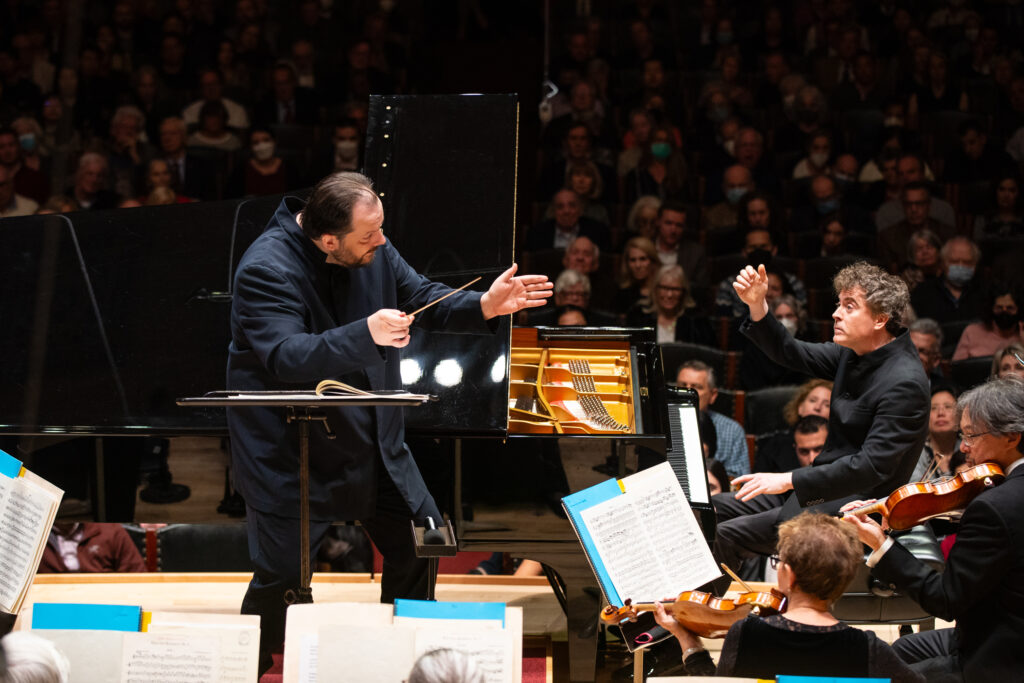Lewis delivers probing and charismatic Beethoven with Nelsons, BSO

Paul Lewis performed Beethoven Piano Concertos Nos. 1 and 3 with Andris Nelsons and the Boston Symphony Orchestra Thursday night. Photo: Robert Torres
What’s a Boston Symphony Orchestra season that doesn’t feature a Beethoven piano concerto? Not this one. Or, for that matter, any of the ten in which Andris Nelsons has been the ensemble’s music director: this repertoire is central to the conductor.
But all five concerti in succession? That’s rarer, though it’s been done six times before in the BSO’s history. Nelsons helmed the most recent of those undertakings, with pianist Paul Lewis at Tanglewood in July 2022.
Last summer’s cycle turned out to be a dry run for this weekend’s marathon of the pentad at Symphony Hall with Lewis, again, as the soloist. Thursday night’s opening concert, which paired the concerti in C – No. 1 (in C major) and No. 3 (in C minor) – got the festivities off to an auspicious start.
As with most of his keyboard music, both of yesterday’s selections were originally intended to showcase Beethoven’s skills as a pianist. He was, by all accounts, a formidable performer and, if the Concerto No. 1 is not his most refined compositional effort, it offers no shortage of late-18th-century pyrotechnics.
Lewis is, in many regards, an ideal interpreter of this fare. He’s a musician’s musician, whose performances are marked by tonal warmth, textural clarity, and rhythmic intensity. This approach, in turn, often emphasizes the elemental characteristics of the musical line.
On Thursday, the rightness of Lewis’s way emerged most thrillingly in the First Concerto’s finale. Here was rollicking, brash Beethoven: dancing, laughing, always full of vigor. The cadenza overflowed with charisma and the coda’s call-and-response volleys between piano and orchestra were the picture of a characterful partnership.
The earlier movements were consistently inviting, if not always quite so electrifying.
In the Allegro con brio, Nelsons presided over an accompaniment that was polished to a high sheen. But, while rhythmically solid, the BSO sometimes sounded a bit too familiar and comfortable with this music.
Lewis, on the other hand, was anything but complacent, drawing a golden, slightly edgy sonority from his instrument. The resultant tonal mismatch, though small, meant that the piano was never covered by the ensemble – but also that soloist and orchestra sometimes felt at odds.
Things settled in the Largo, with the BSO joining Lewis in an absorbing traversal of this luminous movement. Their playing was altogether stately and warm; when the orchestra matched the soloist’s inward focus in pianissimo passages, sparks flew.
More of the same followed in Thursday’s account of the Third Concerto.
Its outer movements were rightly stormy, especially the first, whose taut minore sequences were strongly contrasted by the radiance of its maggiore episodes. Nelsons leaned into the turbulence of the Allegro con brio gamely, though some of his interpretive decisions in the Rondo miscarried (a mid-movement slow-down felt forced, and the fugue was correspondingly sludgy).
Regardless, Lewis’s delivery of his part was incisive: smartly voiced and naturally phrased. Nothing escaped the pianist’s attention, including the keyboard’s pedal indications which, on Thursday, brilliantly illuminated coruscating waves of sound in (especially) the first- and third-movement cadenzas.
Finest, though, was the slow movement, which featured a marriage of exquisite pianism and flawless orchestral playing (the last highlighted by splendidly piquant woodwind contributions). It provided the young season its most transcendent moment yet while offering a bracing reminder of just why this expressively precise, impeccably crafted work sits at the center of the canon.
Opening the night was Hannah Kendall’s The Spark Catchers. Written for Chineke! Orchestra in 2017, the curtain-raiser takes its cue from Lemn Sissay’s eponymous poetic tribute to the Matchwomen’s Strike of late-1880s London.
Would that the music lived up to the London-born, New York-based composer’s charming, spoken introduction.
Instead, it frustrated. Neither the score’s spirited, flickering riffs nor its leaping melodic lines nor its dark-hued turns could redeem a fundamental lack of engaging melodic ideas, ill-defined structure, or the choice to substitute thematic repetition for compelling musical development.
Underwhelming though The Spark Catchers’ content proved, Thursday’s performance from Nelsons was typically assured. The BSO’s brass and woodwind interjections punched above their weight. So did the strings, who confidently sawed through their involved figurations.
The Boston Symphony performs The Spark Catchers and James Lee III’s Freedom’s Genuine Dawn with Beethoven’s Piano Concerto No. 5 at 8 p.m. Saturday at Symphony Hall. bso.org
Posted in Performances



